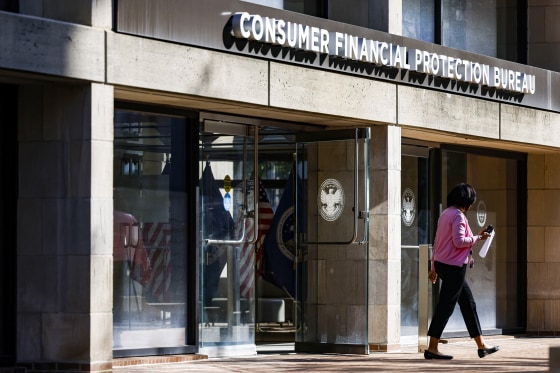The Biden administration announced Wednesday that consumers who use "buy now, pay later" (BNPL) services for purchases are entitled to the same legal protections as consumers who use credit cards.
The new ruling from the Consumer Financial Protection Bureau means consumers will be able to dispute charges and demand refunds for returned products purchased with a BNPL loan. It also means BNPL companies will have to investigate customer disputes — and pause payment requirements while doing so — and provide customers with periodic billing statements.
The agency said its assessment of the BNPL marketplace found the lack of such protections "can create chaos" for consumers who may be rethinking a purchase.
“When consumers check out and choose Buy Now, Pay Later, they don’t know if they will get a refund if they return their product or whether the lender will help them if they didn’t get what was promised,” CFPB Director Rohit Chopra said in a statement.
“Regardless of whether a shopper swipes a credit card or uses Buy Now, Pay Later, they are entitled to important consumer protections under longstanding laws and regulations already on the books” he said.
Use of the lightly regulated installment loans — which allow borrowers to spread the costs of a purchase across several payments with little or no interest — remains relatively limited among American borrowers, but its popularity continues to grow. The Federal Reserve found in a survey this week that about 1 in 7 people used a BNPL service last year, up 2 percentage points from 2022.
Many borrowers have embraced BNPL to avoid credit cards at a time of steep interest rates and higher prices, but the services come with their own pitfalls. BNPL providers don’t universally report to the major credit agencies, but missing payments can still hurt users' credit scores (even though paying on time typically doesn’t boost them).
“President Biden has encouraged his Administration to do everything possible to crack down on corporate rip-offs," Jon Donenberg, deputy director of the National Economic Council and director for competition council policy, said in a statement.
"The Consumer Financial Protection Bureau is answering that call by making sure Buy Now, Pay Later platforms abide by the law, including providing refunds when products are returned or not delivered. The Biden-Harris Administration will continue to take action to protect consumers and keep more money in Americans’ pockets.”
Younger consumers have been key to the growth of these services.
The Fed found 1 in 6 people ages 18-44 used BNPL in 2023, a year in which Generation Z and millennial borrowers shifted more of their spending on daily essentials, like groceries, onto the platforms. Many users have rickety finances. The CFPB found last year that most BNPL customers had higher credit card utilization rates and lower credit scores than non-BNPL borrowers. And as many users lean on the platforms more regularly, some who've been burned are increasingly warning others to steer clear, NBC News has reported.
Wednesday's ruling may face pushback from BNPL firms, just as other recent CFPB announcements have been met by lawsuits from major business groups. A decision by the agency to cap late fees was recently paused after a court ruling in response to one such legal complaint.
In a statement, the Financial Technology Association, which represents BNPL firms, said BNPL products are "fundamentally different" from those provided by credit card companies.
"We look forward to providing additional comments to the CFPB and distinguishing BNPL from products whose business models rely on revolving debt and high consumer fees,” it said.
BNPL lender Klarna said in a statement that it already offers most of the customer remedies being proposed by the agency and said there are key differences between how BNPL works compared with credit card companies.
"It is baffling that the CFPB has overlooked the fundamental differences between interest-free BNPL and credit cards, whose whole business model is based on trapping customers into a cycle of paying sky-high interest rates month after month,” the company said.
Affirm said in a statement that it was encouraged that the CFPB is promoting consistent industry standards, "many of which already reflect how Affirm operates," including dispute and error resolution processes, as well as Truth in Lending disclosures.
"We are committed to continuing to engage with the CFPB as we constantly improve the experience and value we deliver to consumers, as well as our practices," Affirm said.

